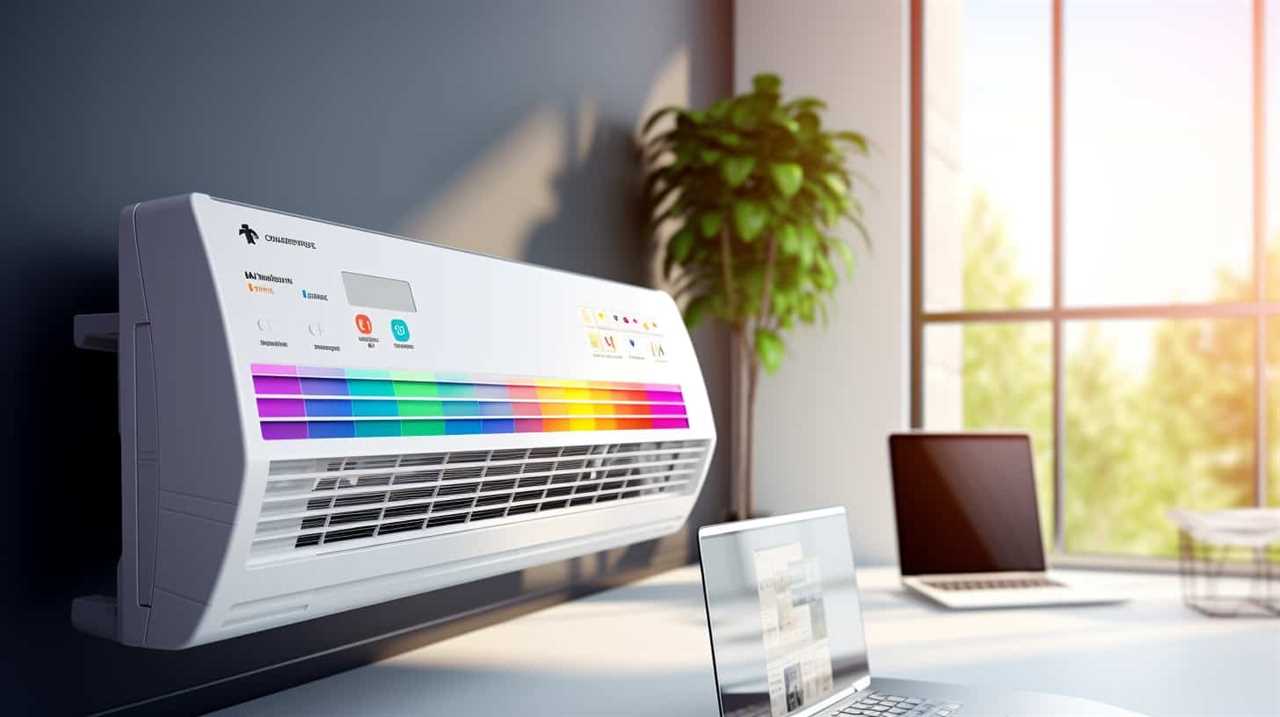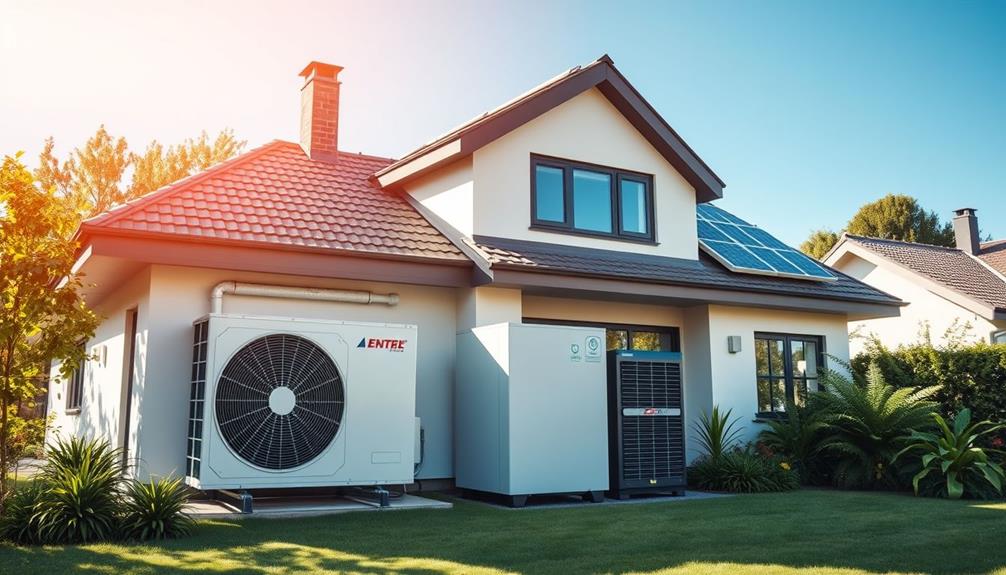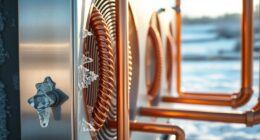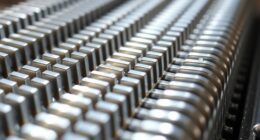Welcome to our indispensable manual on maintaining and installing residential heat pumps.
We’ve got you covered with all the information you need to keep your heat pump running smoothly and efficiently.
From the different types of heat pumps to the importance of regular maintenance, we’ll guide you through the steps for proper installation and common issues you may encounter.
Whether you’re a DIY enthusiast or prefer professional services, we’ve got tips and tricks for everyone.
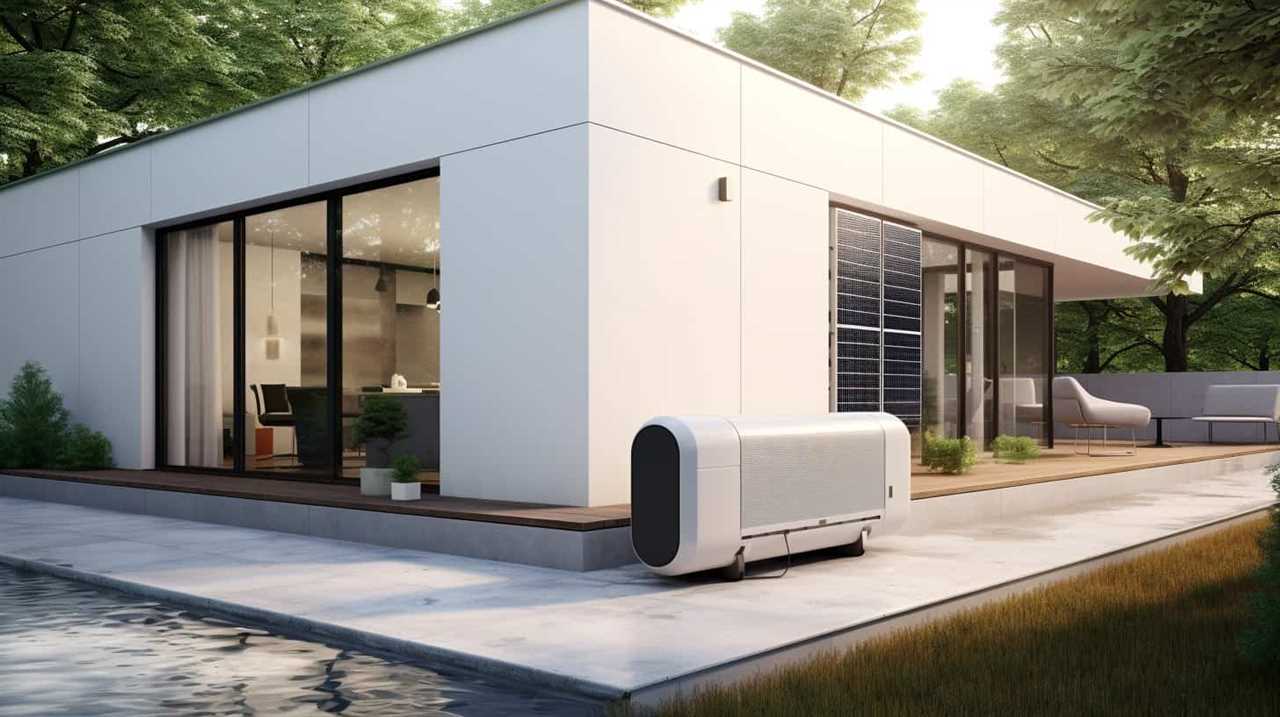
Let’s dive in and optimize your heat pump performance!
Key Takeaways
- Regular maintenance is important for identifying and addressing potential issues before they become major problems.
- Proper installation is crucial for safety and optimal performance of the heat pump.
- Common issues with heat pump systems include noisy operation, inefficient heating or cooling, reduced airflow, refrigerant leaks, and frozen coils.
- To ensure proper functionality, the installation site should be inspected, the heat pump should be sized correctly, energy-efficient practices should be implemented, and the system should be regularly monitored and maintained.
Types of Residential Heat Pumps
We frequently install and maintain various types of residential heat pumps.
When it comes to heat pump efficiency, there are several options available that can help homeowners save energy and reduce their carbon footprint.
One such option is the air-source heat pump, which transfers heat between the indoor and outdoor air. This type of heat pump is highly efficient, as it can extract heat even in cold temperatures.
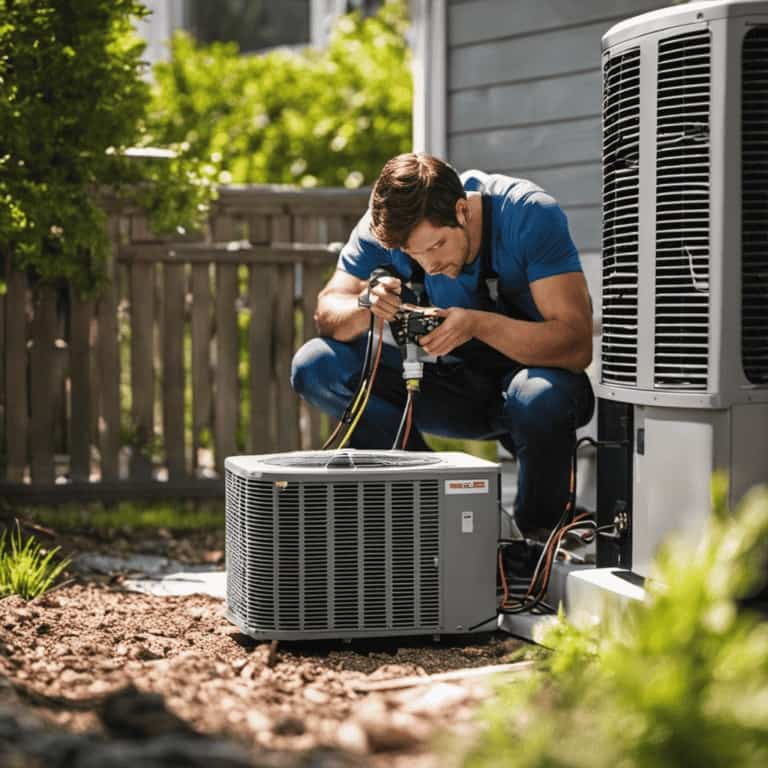
Another option is the ground-source heat pump, which utilizes the constant temperature of the ground to provide heating and cooling. This type of heat pump offers excellent energy savings and is environmentally friendly.
Additionally, there are hybrid heat pumps that combine the benefits of both air-source and ground-source heat pumps, further increasing energy efficiency.
Importance of Regular Maintenance
Regular maintenance is essential for keeping residential heat pumps running efficiently and prolonging their lifespan. By scheduling regular maintenance, homeowners can enjoy several benefits.
Firstly, regular maintenance helps to identify and address potential issues before they become major problems. This can prevent costly repairs and ensure that the heat pump operates at peak efficiency.
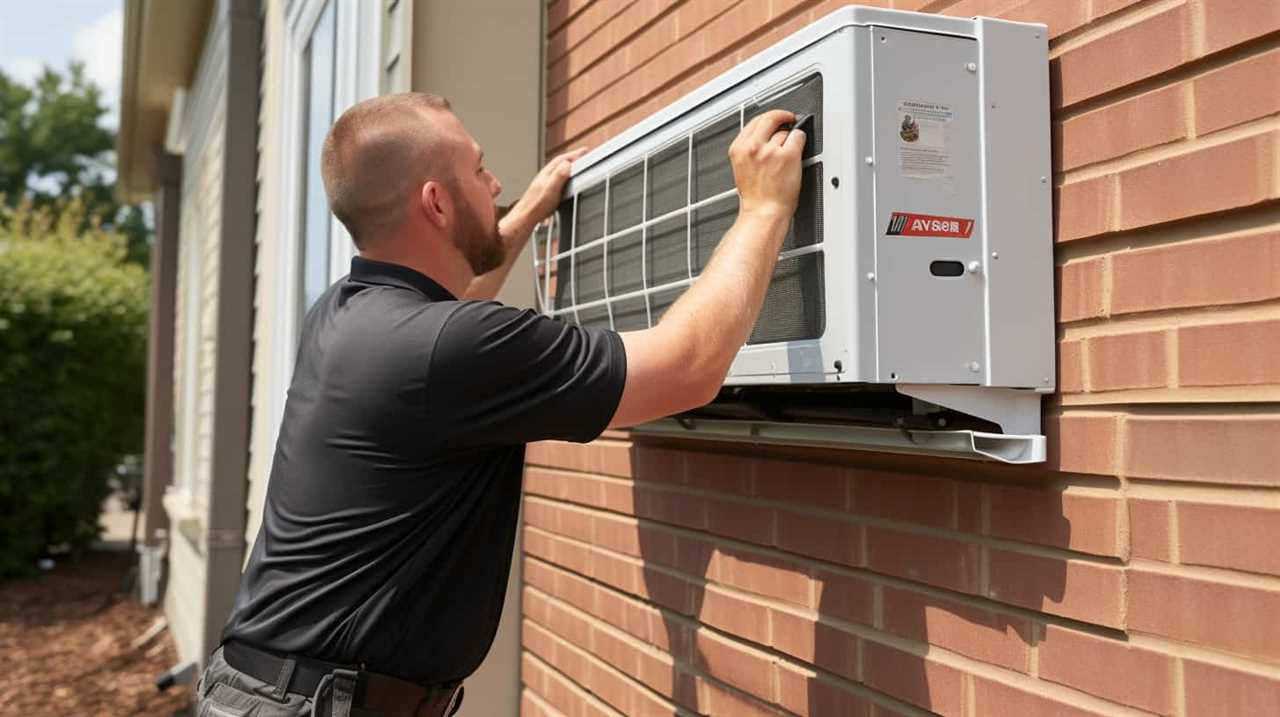
Regular maintenance also helps to improve indoor air quality by cleaning or replacing filters, reducing the presence of allergens and pollutants.
Furthermore, a well-maintained heat pump can help to lower energy consumption and reduce utility bills.
Homeowners should be aware of the signs of a failing heat pump, such as unusual noises, reduced airflow, or inconsistent heating or cooling. By addressing these issues promptly through regular maintenance, homeowners can ensure the longevity and efficiency of their residential heat pump system.
Steps for Proper Heat Pump Installation
Now let’s move on to discussing the points related to proper heat pump installation.
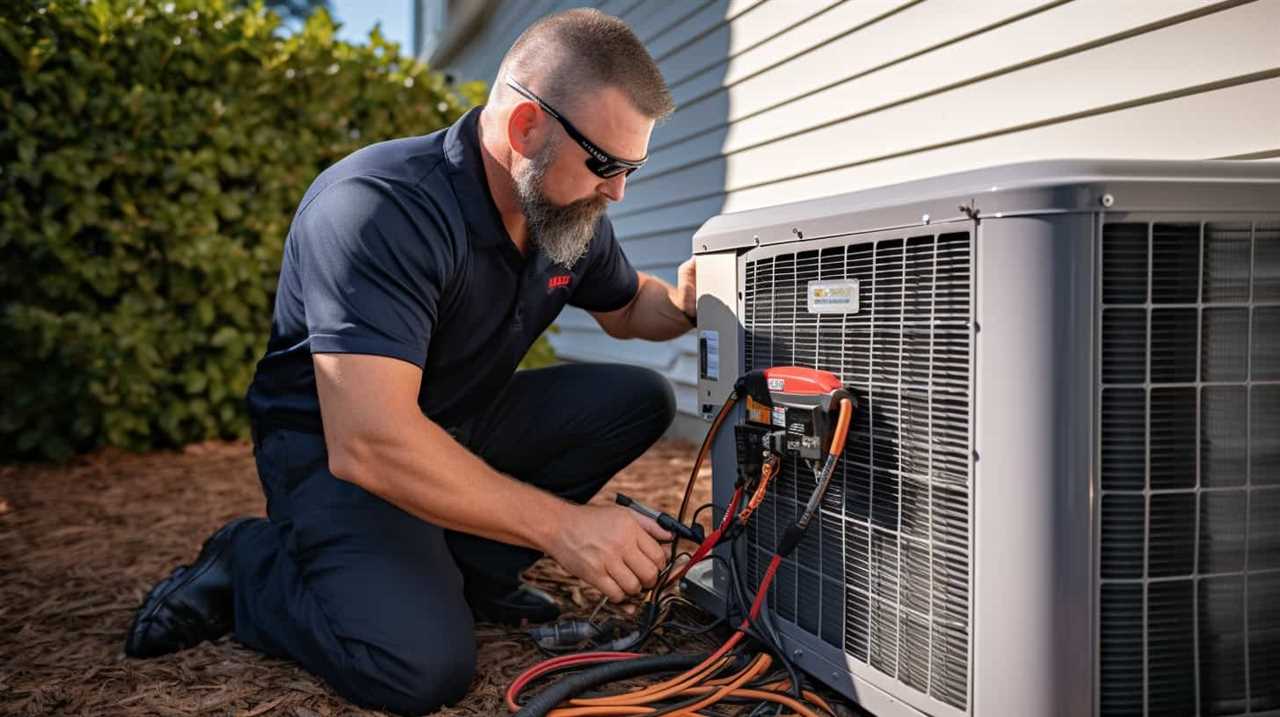
In order to ensure optimal performance and efficiency, it’s important to follow installation best practices. By avoiding common installation mistakes, such as improper sizing or inadequate ductwork, we can prevent issues down the line.
Installation Best Practices
To ensure proper installation of a heat pump, follow these steps for a seamless and efficient process:
-
Pre-Installation Assessment: Conduct a thorough evaluation of the site to determine the heat pump’s optimal location and ensure proper clearance for ventilation and maintenance.
-
Safety Measures: Prioritize installation safety by following all relevant codes and regulations, including proper grounding and electrical connections. Use appropriate personal protective equipment during the installation process.
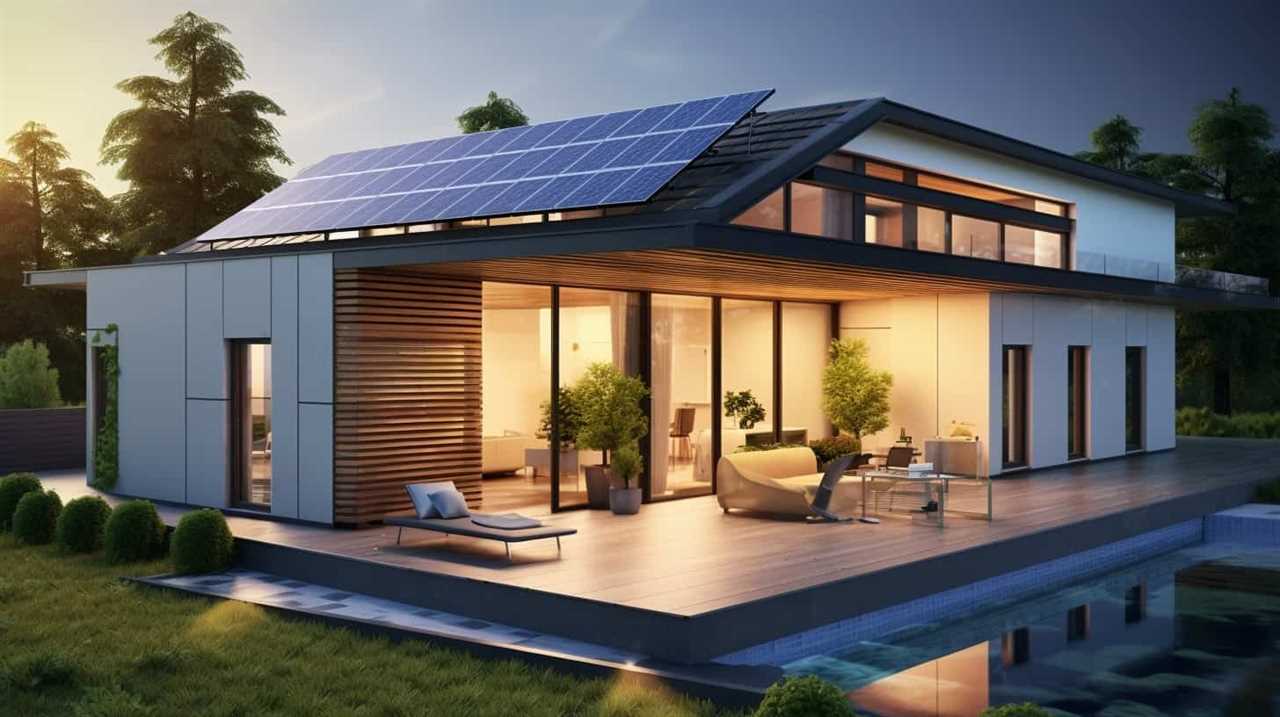
-
Professional Installation: Hire a certified technician with expertise in heat pump installations. They’ll ensure that the unit is correctly sized, connected, and calibrated for optimal performance.
-
Consideration of Cost: While installation cost is an important factor, remember to prioritize quality over savings. Opting for a professional installation may cost more initially, but it will prevent potential issues and ensure long-term efficiency.
Common Installation Mistakes
During the installation process, we need to be aware of common mistakes that can occur and take steps to ensure proper heat pump installation. To avoid these mistakes, it’s important to follow installation precautions and troubleshooting techniques.
One common mistake is improper sizing of the heat pump. It’s crucial to accurately calculate the heating and cooling loads of the space to determine the appropriate size of the unit.
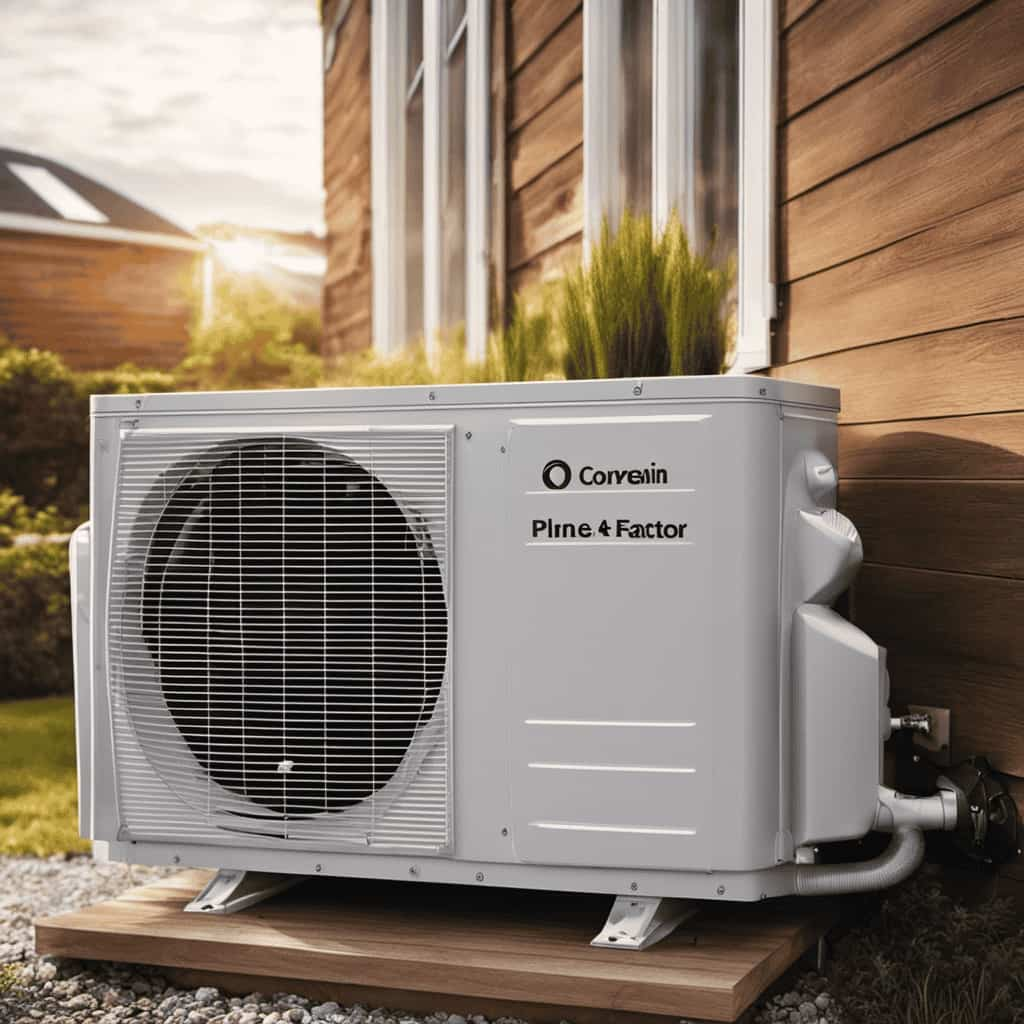
Another mistake is improper refrigerant charging. It’s essential to correctly charge the refrigerant according to manufacturer specifications to ensure optimal performance and efficiency.
Additionally, inadequate air duct design and installation can lead to reduced airflow and system inefficiency.
By carefully considering these installation precautions and troubleshooting techniques, we can avoid these common mistakes and ensure proper functionality of the heat pump system.
In the subsequent section, we’ll discuss the steps for ensuring proper functionality of the heat pump system.

Ensuring Proper Functionality
To ensure proper functionality, we must carefully follow these steps during the heat pump installation process:
-
Conduct a thorough inspection of the installation site to ensure it meets the necessary requirements for optimal performance and efficiency.
-
Properly size the heat pump to match the heating and cooling needs of the space, taking into consideration factors such as insulation levels, square footage, and climate conditions.
-
Implement energy efficient practices during the installation, such as properly sealing ductwork, insulating refrigerant lines, and installing programmable thermostats to maximize energy savings.
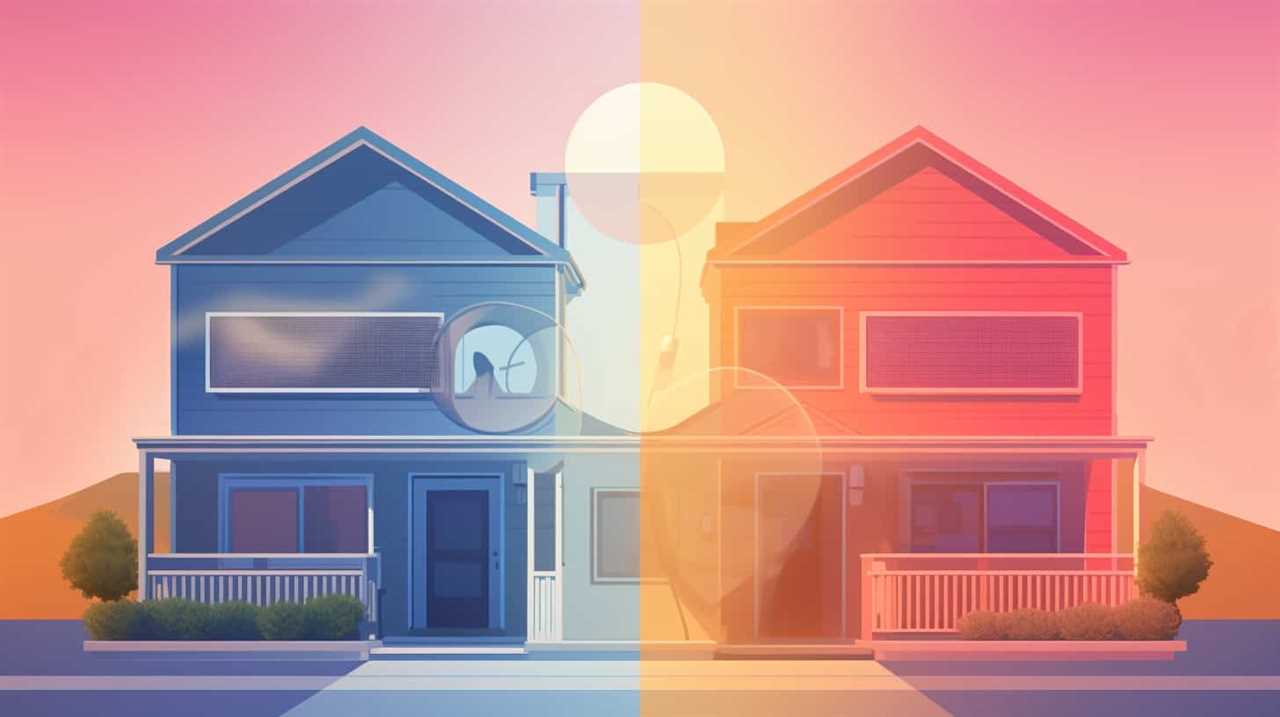
-
Test the heat pump thoroughly after installation to verify its proper functioning and to identify any potential issues that may require troubleshooting techniques.
Common Issues With Heat Pump Systems
Now let’s address some common issues that can arise with heat pump systems.
One of the most noticeable issues is a noisy heat pump, which can be caused by a variety of factors such as loose parts or worn-out components.
Another issue that homeowners may encounter is inconsistent heating or cooling temperatures, which can be a result of thermostat malfunctions or refrigerant leaks.
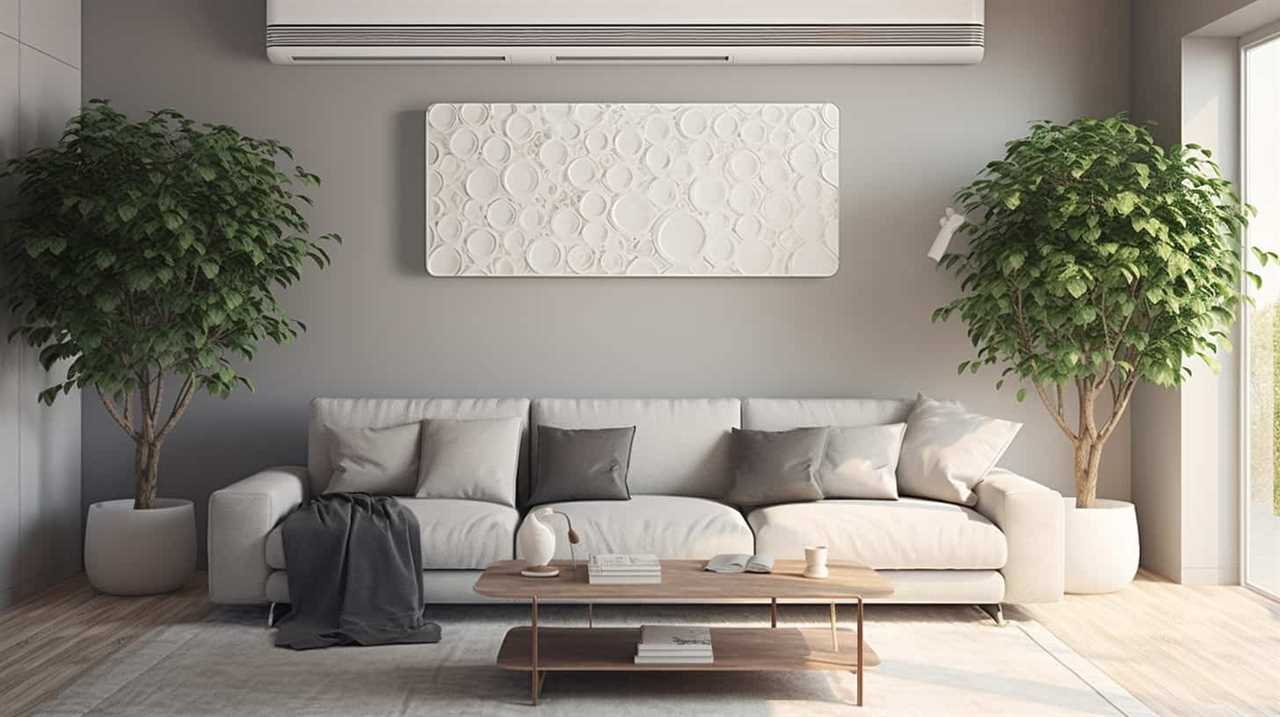
Additionally, poor airflow circulation can be a problem, often caused by clogged filters or blocked ducts.
It’s important to address these issues promptly to ensure optimal performance and comfort in your home.
Noisy Heat Pump
Our heat pump system can sometimes become noisy due to a variety of common issues. Here are some troubleshooting tips to help reduce noise levels:
-
Check for loose parts: Inspect the heat pump for any loose screws, bolts, or panels that may be causing vibrations and noise. Tighten or secure them as needed.
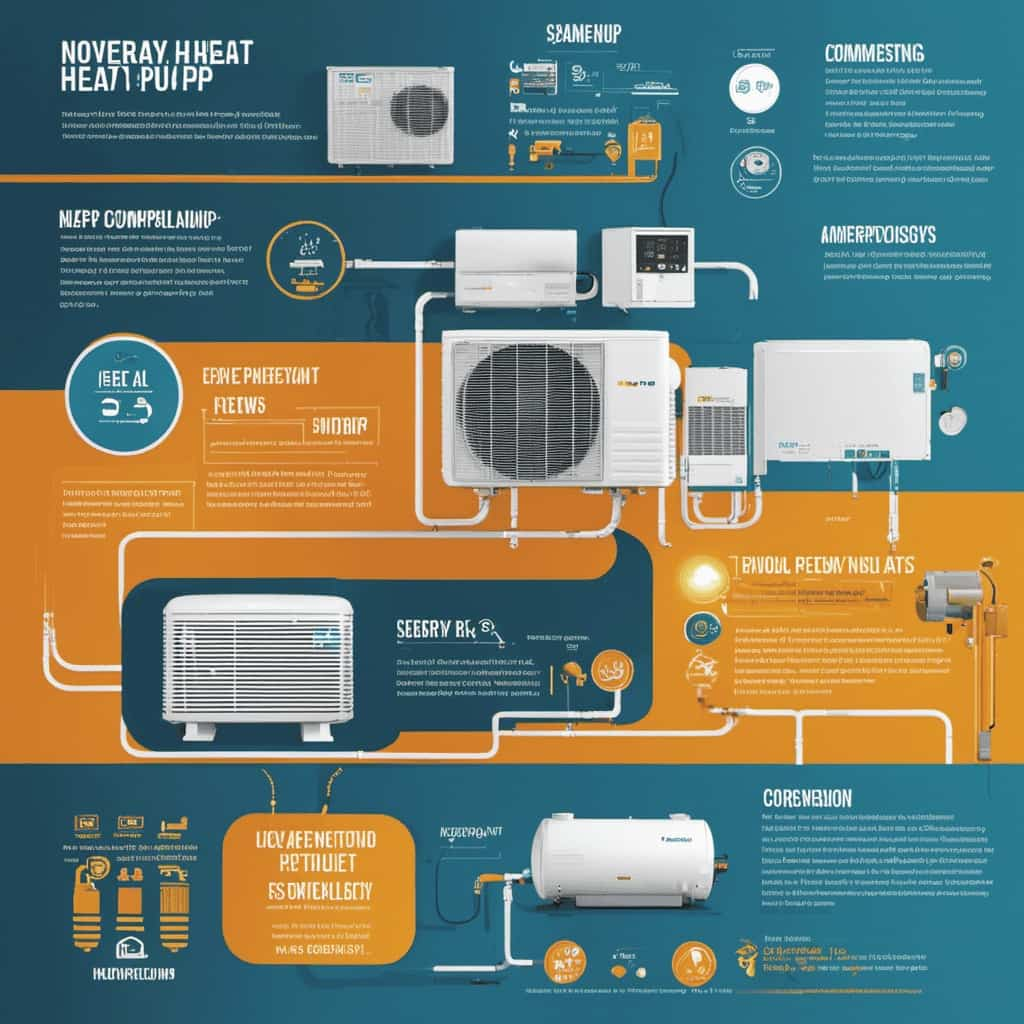
-
Clean the outdoor unit: Debris such as leaves, grass, and dirt can accumulate around the outdoor unit, causing airflow blockages and increased noise. Regularly clean the unit to ensure proper airflow.
-
Inspect the fan blades: Damaged or misaligned fan blades can produce loud noises. Check the blades for any signs of damage or misalignment and replace or realign them if necessary.
-
Consider sound blankets: Sound blankets can be installed around the heat pump to reduce noise levels. These blankets are designed to absorb sound and minimize vibrations.
Inconsistent Heating/Cooling Temperatures
We often experience inconsistent heating/cooling temperatures with our heat pump system, and there are several common issues that could be causing this problem. When troubleshooting temperature control issues, it is important to consider the following factors:
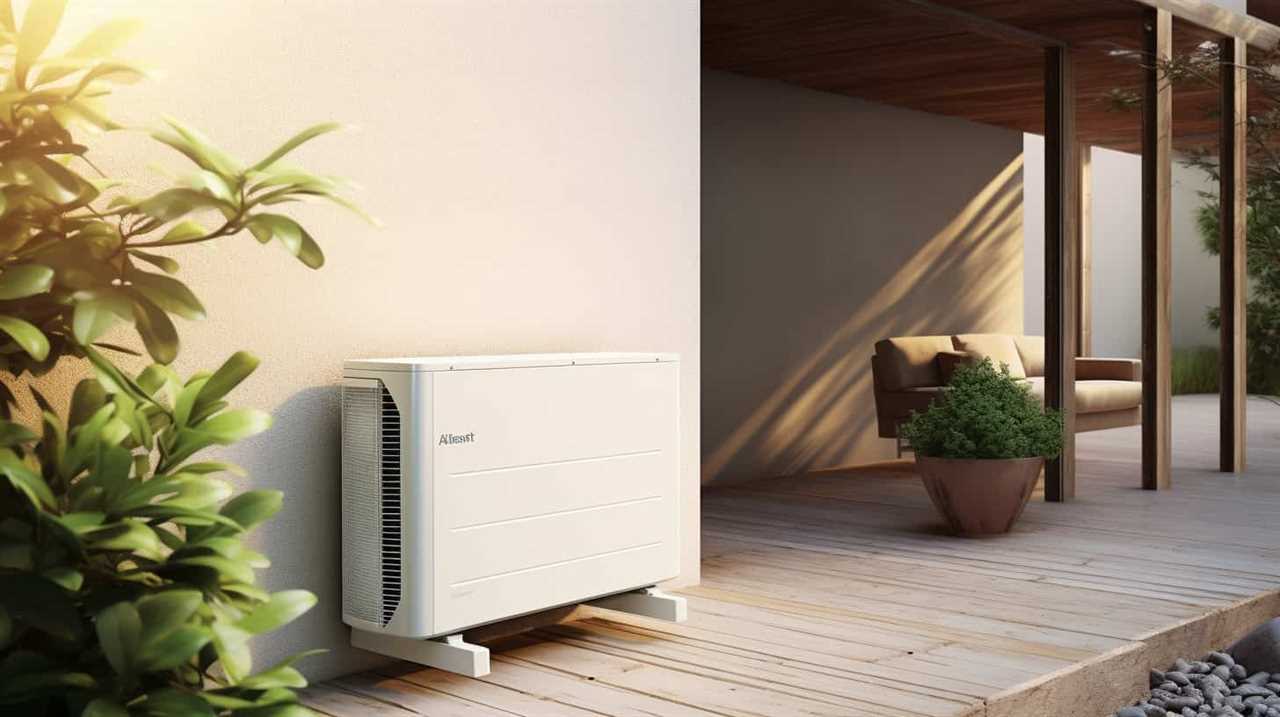
| Common Issues | Possible Causes | Troubleshooting Tips |
|---|---|---|
| Thermostat | Faulty thermostat settings or calibration | Check thermostat settings and recalibrate if necessary. |
| Airflow | Restricted or inadequate airflow | Clean or replace air filters and ensure vents are not blocked. |
| Refrigerant | Low refrigerant levels or leaks | Inspect for refrigerant leaks and recharge if necessary. |
Poor Airflow Circulation
One common issue with heat pump systems is inadequate airflow circulation, which can lead to reduced efficiency and comfort. Improving airflow is crucial for optimal heat pump performance.
Here are some troubleshooting techniques to address poor airflow circulation:
- Check and clean the air filters regularly to ensure they aren’t clogged.
- Inspect and clean the outdoor unit to remove any debris or obstructions.
- Verify that the supply and return vents are open and unblocked.
- Consider installing additional ductwork or adjusting existing ducts to improve airflow distribution.
Tips for Improving Heat Pump Efficiency
How can we improve heat pump efficiency?
Improving energy efficiency is crucial for optimizing the performance of your heat pump system and reducing energy consumption. Here are some tips to help you achieve this goal:
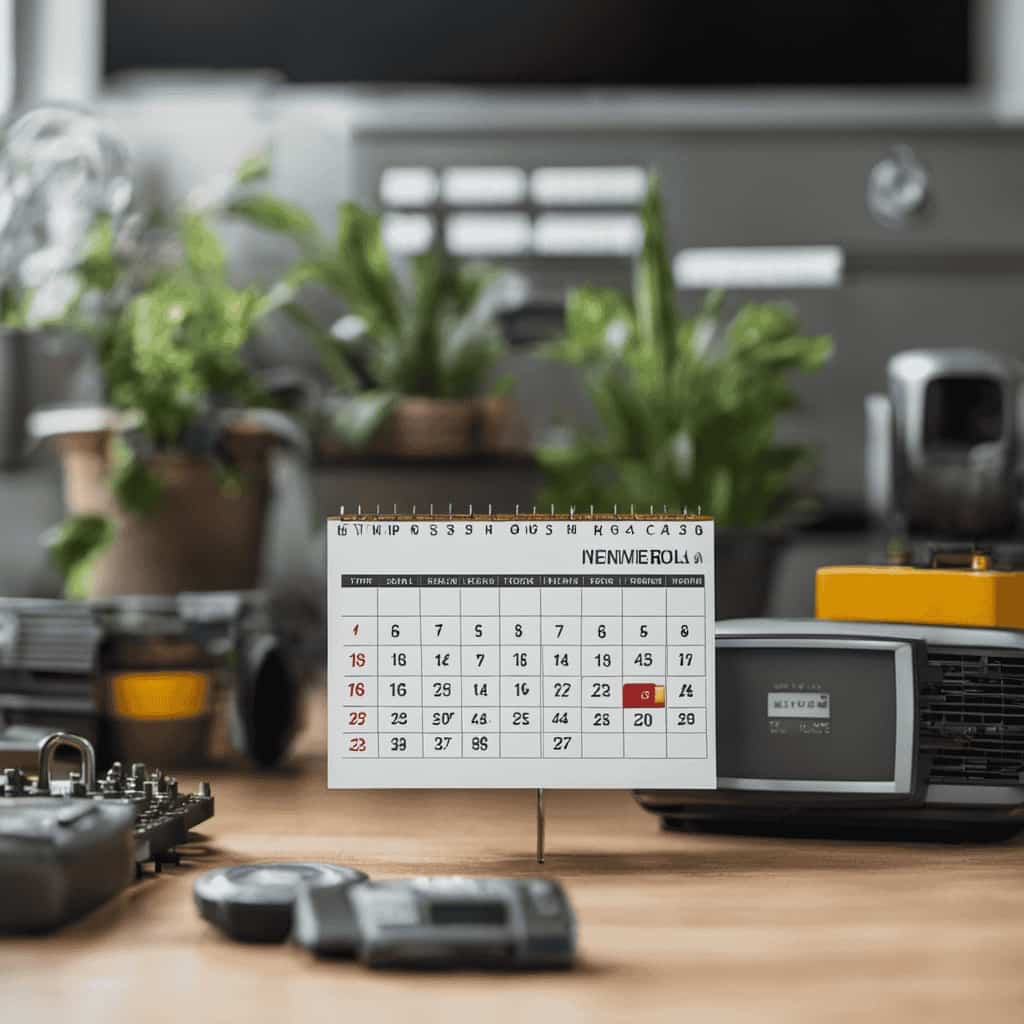
-
Regular maintenance: Schedule annual professional maintenance to ensure your heat pump is operating at peak efficiency. This includes cleaning or replacing air filters, checking refrigerant levels, and inspecting electrical connections.
-
Proper insulation: Insulate your home properly to minimize heat loss or gain. This will help your heat pump work more efficiently by reducing the workload on the system.
-
Thermostat settings: Set your thermostat to the most energy-efficient temperature for your comfort. Lowering the temperature in the winter and raising it in the summer can significantly reduce energy consumption.
-
Airflow optimization: Ensure that there are no obstructions blocking the airflow around your heat pump, both indoors and outdoors. Clean the coils regularly to prevent dust or debris buildup.
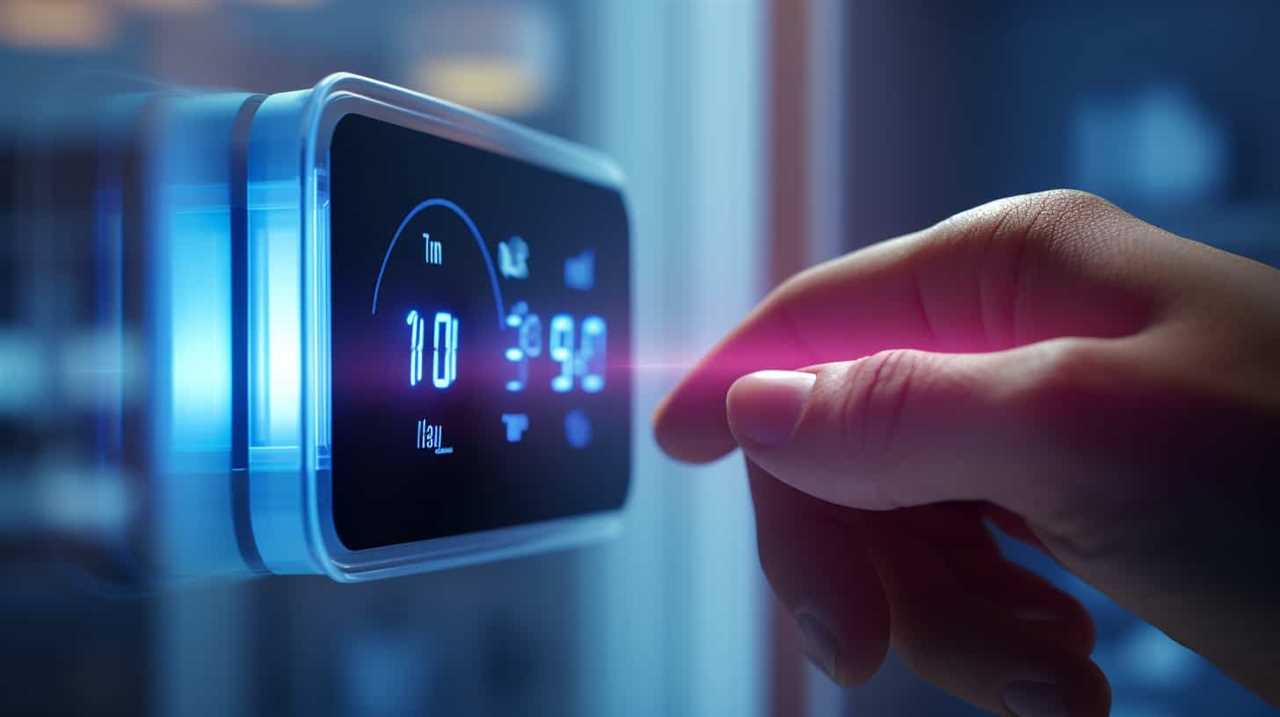
DIY Maintenance for Homeowners
To effectively maintain our heat pumps, homeowners can perform simple DIY tasks such as cleaning air filters and checking for any obstructions. Regular maintenance is crucial in ensuring the optimal performance and longevity of our heat pump systems. Here is a home maintenance checklist with troubleshooting tips to help homeowners keep their heat pumps in excellent condition:
- Clean or replace air filters every 1-3 months, depending on usage.
- Clear any debris, leaves, or obstructions around the outdoor unit.
- Inspect the indoor and outdoor coils for dirt or debris buildup and clean as necessary.
- Check the refrigerant levels and ensure they’re within the manufacturer’s recommended range.
By following these maintenance tasks, homeowners can improve the efficiency of their heat pumps and prevent potential issues.
However, it’s important to note that some maintenance tasks may require professional assistance.
Professional Maintenance Services for Heat Pumps
We recommend scheduling regular professional maintenance services for our heat pumps to ensure optimal performance and longevity.
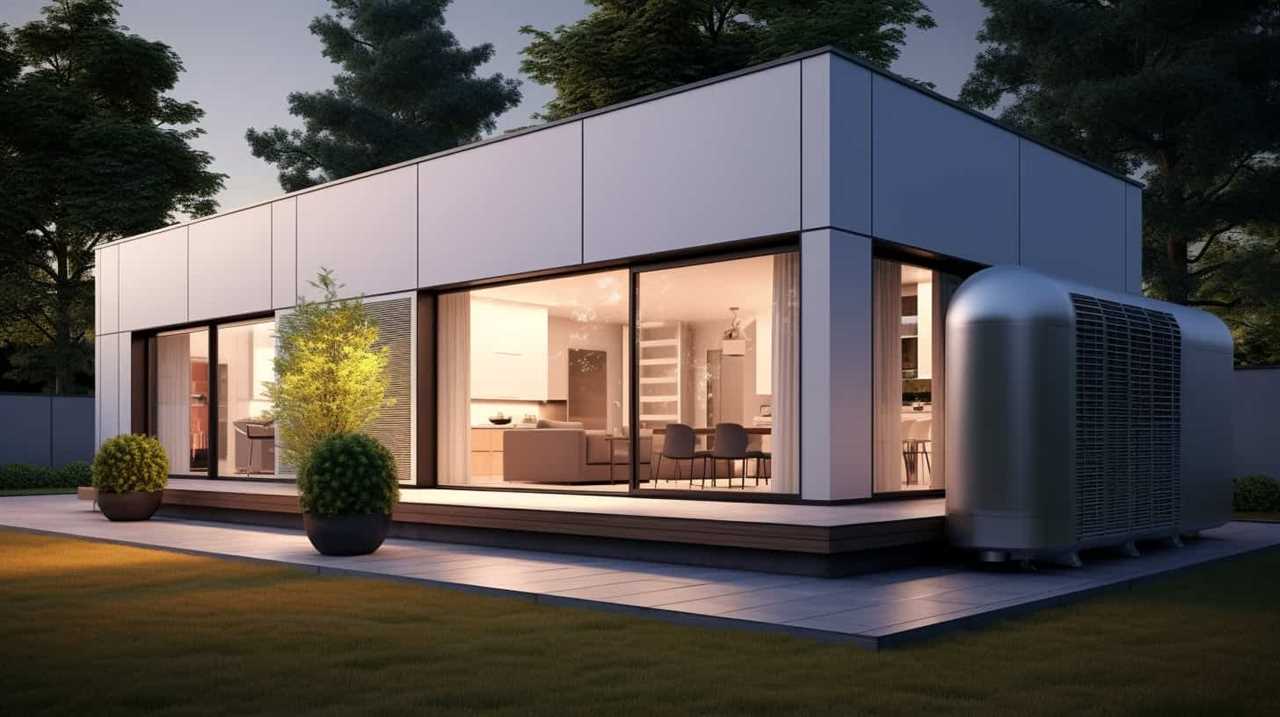
Professional maintenance services are essential for keeping your heat pump running efficiently and preventing costly repairs. These services involve a thorough inspection of your heat pump system, cleaning of the coils and filters, lubrication of moving parts, and checking for any leaks or issues. A professional technician will also test the system’s refrigerant levels and ensure that all electrical connections are secure.
Additionally, during these maintenance visits, the technician can provide valuable heat pump installation tips, such as proper placement and sizing of the unit, to maximize its efficiency.
Frequently Asked Questions
Are There Any Government Incentives or Rebates Available for Installing a Residential Heat Pump?
Yes, there are government incentives and rebates available for installing a residential heat pump. These incentives aim to promote energy savings and encourage the adoption of innovative technologies for a more sustainable future.
How Long Does a Typical Residential Heat Pump Last Before It Needs to Be Replaced?
Residential heat pumps typically last 12-15 years before needing replacement. Signs of replacement include decreased efficiency, frequent breakdowns, and increased energy bills. Regular maintenance can extend the lifespan and optimize performance.
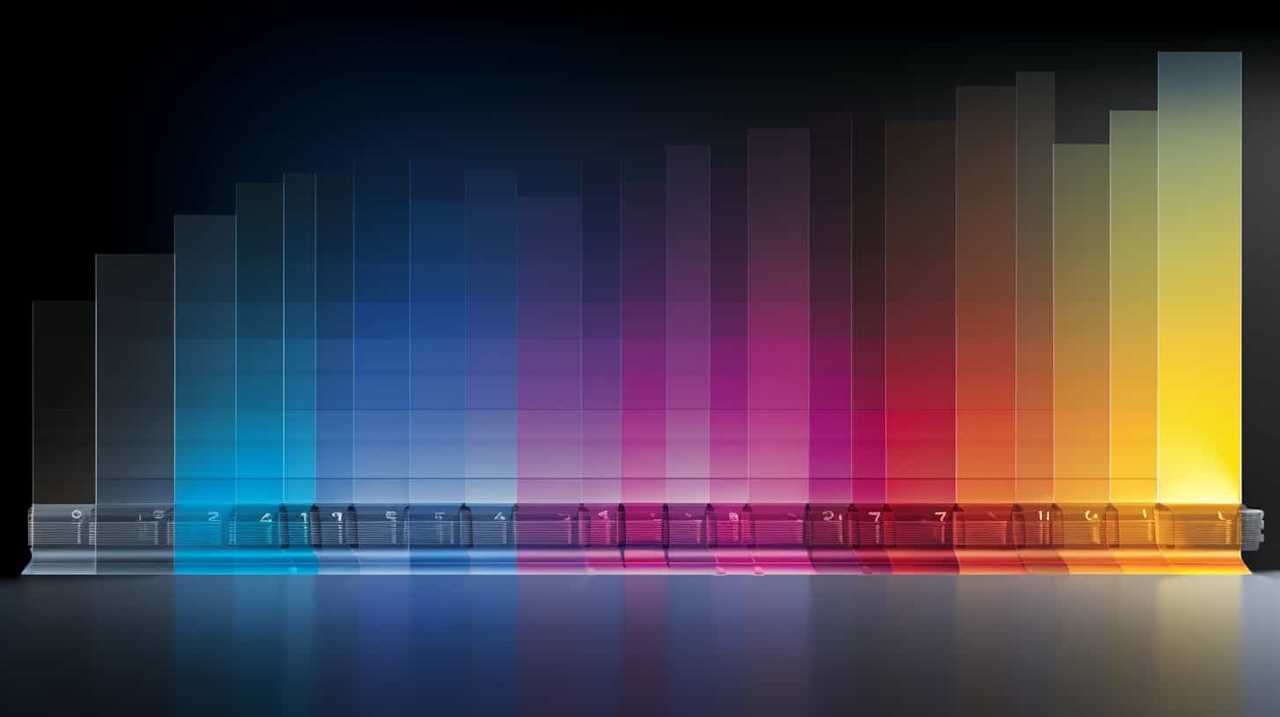
Can a Heat Pump Be Installed in Any Type of Home, or Are There Specific Requirements?
Yes, a heat pump can be installed in any type of home, but there are specific requirements. The installation requirements include sufficient space, proper ventilation, and access to electrical power. Different types of homes, such as single-family houses and townhouses, are suitable for heat pump installation.
Are There Any Specific Safety Precautions Homeowners Should Take When Performing DIY Maintenance on Their Heat Pump?
When performing DIY heat pump maintenance, there are specific safety precautions that homeowners should take. Common mistakes include improper electrical handling, inadequate insulation, and neglecting professional maintenance. It’s essential to prioritize safety and follow guidelines for optimal performance.
Is It Possible to Integrate a Residential Heat Pump With Other Heating or Cooling Systems in the Home?
Yes, it is possible to integrate a residential heat pump with other heating or cooling systems in the home. Combining these systems offers numerous benefits, such as increased efficiency and comfort.
Conclusion
In conclusion, regular maintenance and proper installation are crucial for the efficient and long-lasting performance of residential heat pumps. By following the outlined steps and tips, homeowners can improve the efficiency of their heat pump systems, leading to energy savings and reduced costs.
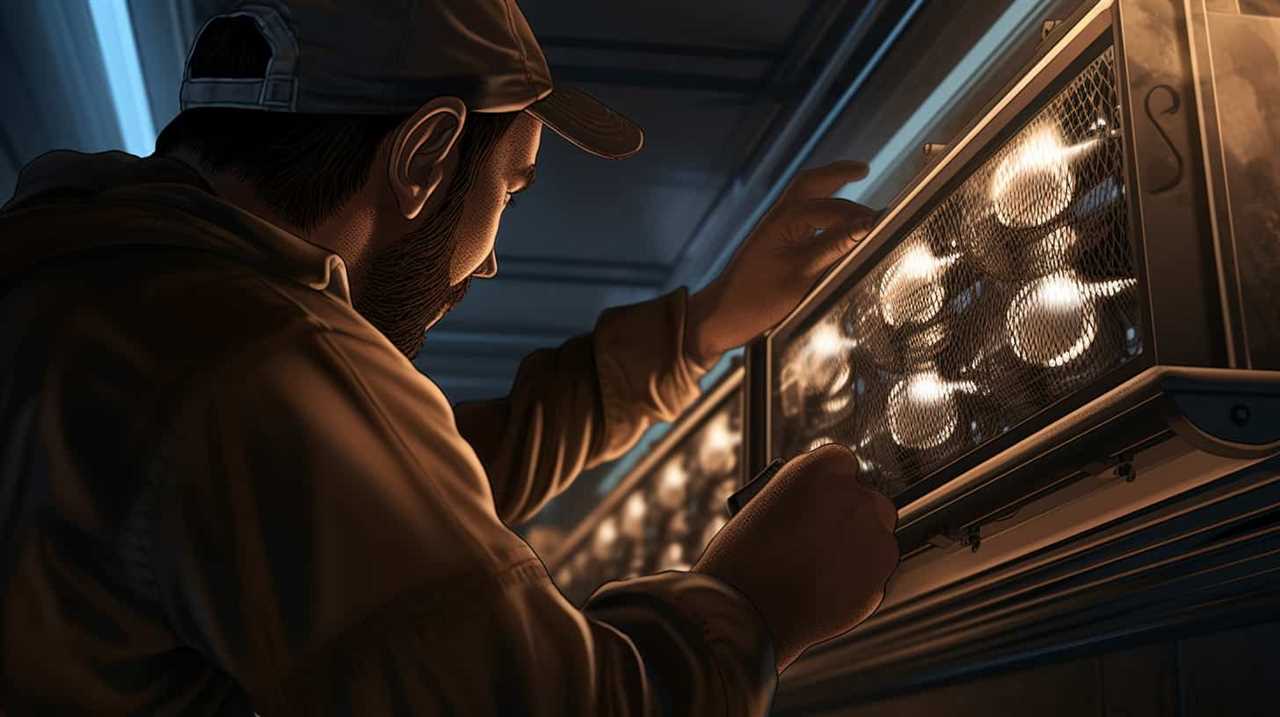
Interestingly, studies have shown that well-maintained heat pumps can provide up to 40% more heating and cooling capacity compared to those that aren’t properly maintained, emphasizing the importance of regular upkeep.
